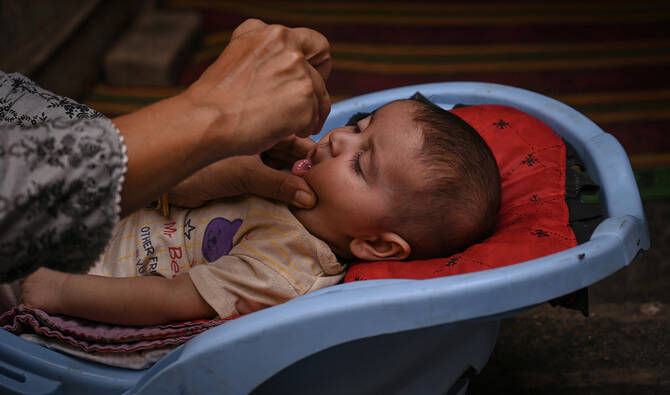ISLAMABAD: Pakistan has launched a third nationwide anti-polio vaccination campaign of this year that aims to inoculate 45 million children under five, the country’s polio program said on Sunday.
The campaign was formally inaugurated by Ayesha Raza Farooq, the prime minister’s focal person for polio eradication, who administered oral polio vaccine and Vitamin A drops to children under five at the National Emergency Operations Center (NEOC) in Islamabad.
Polio is a paralyzing disease with no cure. Multiple doses of the oral polio vaccine, along with the completion of the routine immunization schedule for all children are essential to ensure strong immunity against the disease.
Pakistan has confirmed 10 cases so far this year, according to the polio program. Environmental surveillance has detected the virus in 272 sewage samples from 127 testing sites, across 68 districts, signaling continued circulation.
“Polio eradication is not just a health goal — it is a national imperative and a matter of immense pride for our country,” Farooq said.
“This third campaign of 2025 marks a decisive milestone in our 2-4-6 roadmap. These back-to-back rounds from September 2024 to May 2025 represent our most strategic opportunity to close immunity gaps and halt virus circulation before the high transmission season begins.”
Pakistan and Afghanistan are the only two countries in the world where polio remains endemic.
The polio program described the weeklong campaign as a critical intervention in Pakistan’s “final push” to interrupt poliovirus transmission and achieve eradication by end of 2025.
Farooq acknowledged persistent challenges in areas such as Karachi, southern Khyber Pakhtunkhwa province and Quetta, but noted encouraging progress in reaching previously underserved populations.
Around 400,000 frontline workers, including 225,000 woman vaccinators, are powering the campaign, according to the polio program.
Speaking at the event, UNICEF Representative in Pakistan Abdullah Fadil, who just concluded his tenure, expressed confidence in the program’s direction.
“Pakistan is closer than ever to making history. With continued political will, community engagement, and coordinated action by all partners, I believe this country can soon achieve a polio-free future,” he said.
Pakistan’s polio program began in 1994, but efforts to eradicate the virus have been repeatedly undermined by vaccine misinformation and resistance from some religious hard-liners who claim that immunization is a foreign plot to sterilize Muslim children or a cover for Western espionage.
Militant groups have also frequently targeted polio vaccination teams and the security personnel assigned to protect them, often resulting in deadly attacks.
The polio program has urged public to cooperate with vaccination teams and report any missed children via the Sehat Tahaffuz Helpline 1166 or the WhatsApp Helpline at 0346-7776546.












